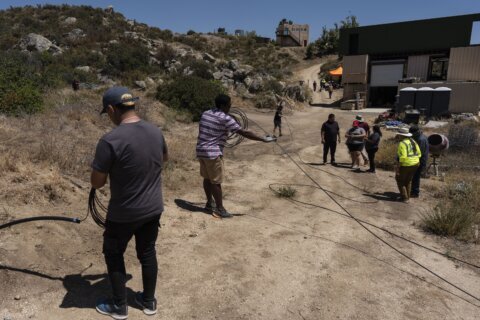Months before an armed man took aim at Donald Trump at a presidential campaign rally in rural Pennsylvania, some state lawmakers had proposed to outlaw the type of rifle used in the assassination attempt.
The legislation stalled without coming to a vote, but that was no surprise. Politically divided Pennsylvania has been at a standstill for years on gun policy, lacking enough support to either strengthen or relax existing firearm laws.
That’s unlikely to change as a result of the shooting at Trump’s rally, which killed an attendee, seriously injured two others and wounded the ear of the Republican presidential nominee.
“Sadly, we’ll probably be stuck with our similar gun laws, which are not strong enough,” said Democratic state Rep. Ben Sanchez, the sponsor of several gun-control measures, including one to outlaw certain semiautomatic firearms.
Legislatures in more than half the states have passed new gun laws this year, nearly matching the count from the previous year, according to an Associated Press review. That’s brought more restrictions in Democratic-led states, such as longer waiting periods to purchase guns in Maine and New Mexico and a prohibition on selling ammunition to those younger than 21 in Hawaii.
In Republican-led states, those new laws generally have fortified gun rights, including new allowances for adults to carry concealed guns without permits in Louisiana and South Carolina. Numerous GOP-led states also have passed prohibitions on the use of special gun store tracking codes for credit card purchases.
But political divisions often thwart gun legislation in Pennsylvania. One exception came in October 2018, when then-Democratic Gov. Tom Wolf signed a bill passed by the Republican-led House and Senate requiring people convicted of domestic violence or subject to final restraining orders to surrender their guns within 24 hours.
A few weeks later, a fatal mass shooting at a Pittsburgh synagogue put Pennsylvania back in the spotlight. The General Assembly responded by creating a five-year, $5 million grant program to fund security improvements for houses of worship and other nonprofit organizations that could be targets of hate crimes.
But there’s been little bipartisan agreement since then.
In 2021, Wolf vetoed a Republican-backed bill to allow people to carry concealed guns without a permit. The next year, he vetoed another GOP-backed bill that would have allowed lawsuits against local governments that regulate the ownership, possession, transfer or transportation of guns in violation of a state ban on such local ordinances.
But Wolf wasn’t the only one blocking bills. House Republicans used a procedural move in 2022 to block a Democratic bill that would have prevented people younger than 21 from possessing certain semiautomatic weapons. Republicans completely changed the bill to instead allow anyone to carry concealed guns. It did not ultimately become law.
In the November 2022 elections, Democrats won a one-seat majority in the Pennsylvania House and soon began advancing various gun-control measures.
The House passed bills last year to expand background checks for gun sales and allow judges to order the removal of guns — at the request of police or family members — from people who are deemed to pose risks to themselves or others. This year, the House passed a bill to ban “ghost guns,” which lack serial numbers. But all three measures stalled in the Republican-led state Senate.
Three other measures failed in close House votes. They include bills that would have banned trigger devices causing guns to fire rapidly, required gun sales to be reported electronically to the State Police, and required gun owners to report lost or stolen weapons within 72 hours.
Sanchez’s bill outlawing what it describes as assault weapons advanced out of a House committee in January but has gone no further. Though the bill had an exception for guns that are already legally owned, Sanchez said the intent was to ban the type of AR-15-style rifle that authorities say was used by the 20-year-old man who shot Trump.
After the shooting, Pennsylvania Attorney General Michelle Henry called on lawmakers in Pennsylvania, other states and Congress to create “assault weapons bans.”
“When one of the most secure and protected individuals on the planet — a former United States President — is not immune from dangers presented by the prevalence and accessibility of high-capacity, long-range assault weapons, we must react and reexamine our collective indifference to addressing this issue,” Henry told the AP.
Ten states and the District of Columbia already have laws generally prohibiting the sale, transfer or manufacture of what they describe as assault weapons, though their definitions vary.
But it’s politically difficult in to pass such bans because the AR-15 has become “a symbol of freedom” to ardent gun-rights supporters, said Adam Garber, executive director of the gun violence prevention group CeaseFirePA.
Trump didn’t mention gun policies while recounting his shooting during a speech at the Republican National Convention. But some Trump supporters said they remain wary of efforts to further restrict guns.
“I feel like the gun laws we have in place are pretty good,” said Michele Tomsik, a nurse who attended Trump’s rally with her 15-year-old daughter and crouched to the ground with others when the shots rang out.
The shooter used a gun that authorities said had been legally purchased by his father and had searched online for information about major depressive disorder, though investigators haven’t determined whether he was actually diagnosed.
Tomsik said she wants more state resources devoted to mental health care, though she said the shooting also raises some questions about guns.
“Why do you have an AR? Where did that come from? How did he get it and why? Tomsik said rhetorically. “But I do worry that if we start retracting back everything like that, then they take away more and more and more” Second Amendment rights.
Research is largely inconclusive about the effectiveness of state “assault weapon” bans, said Rosanna Smart, co-director of the RAND Gun Policy in America Initiative, which released an analysis earlier this week.
The RAND report said there’s better research on other gun policies. It cited supportive evidence that safe gun-storage laws reduce firearm injuries and deaths among youth; higher minimum age requirements for gun purchases can reduce suicides among young people; and increased firearm homicides are associated with looser concealed-carry laws and stand-your-ground self-defense laws.
High-profile incidents such as the assassination attempt against Trump often spur renewed discussion about gun policies and mass shootings, Smart said.
“It’s going to be really, really difficult to know what types of gun policies are going to be effective in reducing their occurrence,” she said. “But they offer opportunities to kind of step back and reconsider the state and federal legal landscapes around guns.”
Copyright © 2024 The Associated Press. All rights reserved. This material may not be published, broadcast, written or redistributed.







